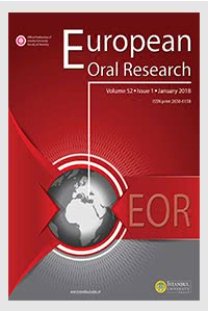Evaluation of salivary tumour necrosis factor–alpha in patients with recurrent aphthous stomatitis
DOI: 10.26650/eor.2018.543Purpose
Present study was undertaken to evaluate
and compare the salivary levels of tumour necrosis factor alpha (TNF-α) in subjects with RAS, traumatic ulcers (TUs) in the oral mucosa
and in healthy controls.
Materials and Methods
Present study involved 90 participants of
which 30 subjects were diagnosed with RAS, 30 subjects with TUs and 30 healthy
controls grouped as group 1, group 2 and group 3 respectively. Unstimulated
saliva was collected from the subjects through ‘Spit Technique’ and the estimation of TNF-α was done by
enzyme linked immunosorbent assay. The
data collected was statistically analysed.
Results
Salivary level of TNF-α was
significantly higher in RAS patients than in patients with TUs and healthy
controls. Difference between the Salivary TNF-α
level in our study groups were statistically significant (p<0.001).
Conclusion
Present study suggests that saliva is a
convenient and ideal medium for the detection of TNF-α. Statistically significant difference in the
level of salivary TNF-α between the RAS and TUs subjects as
well as controls suggests the significant contribution of TNF-α in pathogenesis of RAS.
Keywords:
Recurrent aphthous stomatitis; tumour necrosis factor-alpha; saliva; oral mucosa; traumatic ulcer,
___
- 1. Natah SS, Konttinen YT, Enattah NS, Ashammakhi N, Sharkey KA, Häyrinen-Immonen R. Recurrent apthous ulcers today: a review of growing knowledge. Int J Oral Maxillofac Surg 2004; 33: 221-34. 2. Porter SR, Scully C, Pedersen A. Recurrent aphthous stomatitis. Crit Rev Oral Biol Med 1998; 9: 306-21. 3. Jurge S, Kuffer R, Scully C, Porter SR. Mucosal disease series: Number VI. Recurrent aphthous stomatitis. Oral Dis 2006; 12: 1-21. 4. Sawair FA. Recurrent apthousstomatitis: Do we know what patients are using to treat the ulcers? . J Altern Complement Med 2010; 16: 651-5. 5. Eisenberg E. Diagnosis and treatment of recurrent aphthous stomatitis. Oral Maxillofacial Surg Clin N Am 2003; 15: 111-22. 6. Akintoye SO, Greenberg MS. Recurrent aphthous stomatitis. Dent Clin North Am 2014; 58: 281-97. 7. Kutcher MJ, Ludlow JB, Samuelson AD, Campbell T, Pusek SN. Evaluation of a bioadhesive device for the management of aphthous ulcers. J Am Dent Assoc 2011; 32: 368-76. 8. Eguia-del Valle A, Martinez-Conde-Llamosas R, López-Vicente J, Uribarri- Etxebarria A, Aguirre-Urizar JM. Salivary levels of Tumour Necrosis Factor-alpha in patients with recurrent aphthous stomatitis. Med Oral Patol Oral Cir Bucal 2011; 16: e33-6. 9. Rivera-Hidalgo F, Shulman JD, Beach MM. The association of tobacco and other factors with recurrent aphthous stomatitis in an US adult population. Oral Dis 2004; 10: 335-45. 10. Boras VV, Lukac J, Brailo V, Picek P, Kordić D, Zilić IA. Salivary interleukin-6 and tumor necrosis factor-alpha in patients with recurrent aphthous ulceration. J Oral Pathol Med 2006; 35: 241-3. 11. Natah SS, Häyrinen-Immonen R, Hietanen J, Malmström M, Konttinen YT. Immunolocalization of tumor necrosis factor-alpha expressing cells in recurrent aphthous ulcer lesions (RAU). J Oral Pathol Med 2000; 29: 19-25. 12. Sun A, Wang JT, Chia JS , Chiang CP. Levamisole can modulate the serum tumor necrosis factor-a level in patients with recurrent aphthous ulcerations. J Oral Pathol Med 2006; 35: 111-6. 13. Al-Ghurabei BH, Saliah MM. Role of salivary tumor necrosis factor-alpha and immunoglobulin- a in recurrent aphthous stomatitis. J Fac Med Baghdad 2011; 53: 207-10. 14. Slebioda Z, Szponar EZ, Kowalska A. Etiopathogenesis of recurrent aphthous stomatitis and the role of immunologic aspects: literature review. Arch Immunol Ther Exp 2014; 62: 205-15. 15. Beutler B, Cerami A. Cachectin: more than a tumor necrosis factor. N Engl J Med 1987; 316: 379-85. 16. Hegde S, Harini K, Ajila V, Babu S, Shetty SR. Prevalence of recurrent aphthous stomatitis: An institutional study. Cumhuriyet Dent J 2015; 18: 228-34. 17. Byahatti SM. Incidence of Recurrent Apthous ulcers in a group of student population in Libya: A Questionnaire Study. Arch Cran Oro Fac Sc 2013; 1: 26-30. 18. Atai Z, Ansari M, Torabi N. Efficacy of Olive Leaf Extract in the Treatment of Minor Oral Aphthous Ulcers. Am J Infect Diseas 2007; 3: 24-6. 19. Belenguer-Guallar I, Jiménez-Soriano, Claramunt-Lozano A. Treatment of recurrent aphthous stomatitis. A literature review. J Clin Exp Dent 2014; 6: e168-74. 20. Brocklehurst P, Tickle M, Glenny AM, Lewis MA, Pemberton MN, Taylor J, Walsh T, Riley P, Yates JM. Systemic interventions for recurrent aphthous stomatitis (mouth ulcers). Cochrane Database Syst Rev 2012; 9: CD005411. 21. Ship JA, Chavez EM, Doerr PA, Henson BS, Sarmadi M. Recurrent aphthous stomatitis. Quintessence Int 2000; 31: 95-112. 22. Scully C, Gorsky M, Lozada-Nur F. The diagnosis and management of recurrent aphthous stomatitis: a consensus approach. J Am Dent Assoc 2003; 134: 200-7. 23. Avci E, Akarslan ZZ, Erten H, Coskun-Cevher S. Oxidative stress and cellular immunity in patients with recurrent aphthous ulcers. Brazilian Journal of Medical and Biological Research 2014; 47: 355-60. 24. O’Neill ID, Scully C. Biologics in oral medicine: ulcerative disorders. Oral Dis 2013: 19: 37-45.
- ISSN: 2630-6158
- Yayın Aralığı: Yılda 3 Sayı
- Başlangıç: 1967
- Yayıncı: İstanbul Üniversitesi
Sayıdaki Diğer Makaleler
Gamze AREN, Arzu Pınar ERDEM, Özen Doğan ONUR, Gülsüm AK
Halenur ALTAN, Zeynep GÖZTAŞ, Gülsüm İNCİ, Gül TOSUN
Ahmet ALTAN, Mutan Hamdi ARAS, İbrahim DAMLAR, Hasan GÖKÇE, Oğuzhan ÖZCAN, Cansu ALPASLAN
Alper SİNDEL, Olgu Nur DERECİ, Mükerrem HATİPOĞLU, Öznur ÖZALP, Burak KOCABALKAN, Adnan ÖZTÜRK
İlkay PEKER, Berrin ÇELİK, Umut PAMUKÇU, Özlem ÜÇOK
Gülşilay SAYAR, Hüsamettin OKTAY
Shruthi HEGDE, Vidya AJİLA, Subhas BABU, Suchetha KUMARİ, Harshini ULLAL, Ananya MADİYAL
Gökhan GÜRLER, Çağrı DELİLBAŞI, İpek KAÇAR
Damla AKŞİT BIÇAK, Nafiye URGANCI, Seap AKYÜZ, Merve USTA, Nuray USLU KIZILKAN, Burçin ALEV, Ayşen YARAT
